A Home at the End of the World
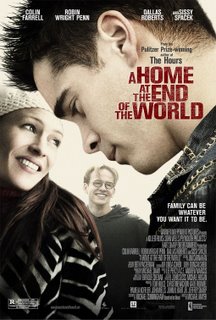
A Home at the End of the World
2004
Starring: Colin Farrell, Robin Wright Penn, Dallas Roberts
Director: Michael Mayer
Rating: R
Distributor: Warner Independent
Release Date: 07.23.04
Farrell Hits "Home" in Story of Family
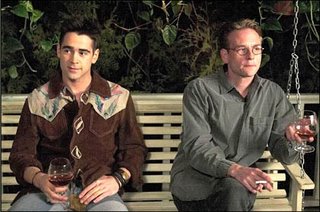 If anyone needed proof that Irish actor Colin Farrell was more than just another pretty face, they would need look no farther than the “A Home at the End of the World.” Based on the acclaimed novel by The Hours scribe Michael Cunningham, Farrell is – quite simply – sensational. A breathy lamb lost amidst the headlights of the world, the actor turns in a nuanced, tour de force performance that screams Oscar. As good as he’s been in works as varied as “Tigerland,” “Phone Booth,” “Daredevil” and “Minority Report,” he outdoes himself this time, elevating a rather cluttered (and slightly tired) narrative into a near-unforgettable experience.
If anyone needed proof that Irish actor Colin Farrell was more than just another pretty face, they would need look no farther than the “A Home at the End of the World.” Based on the acclaimed novel by The Hours scribe Michael Cunningham, Farrell is – quite simply – sensational. A breathy lamb lost amidst the headlights of the world, the actor turns in a nuanced, tour de force performance that screams Oscar. As good as he’s been in works as varied as “Tigerland,” “Phone Booth,” “Daredevil” and “Minority Report,” he outdoes himself this time, elevating a rather cluttered (and slightly tired) narrative into a near-unforgettable experience.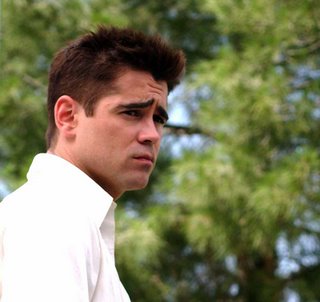
The story itself is a rather unique examination of home and family. Following the emotional maturation of Bobby (played by Farrell as an adult), “A Home at the End of the World” doesn’t concern itself with tidy resolutions or easy answers. Instead, its focus is upon internal exploration, the ability to discover and experience all ranges of the human condition both within oneself and in others. Like Virginia Woolfe, so well ahead of her time, Cunningham has the insight to realize family isn’t necessarily a father and a mother but instead sometimes made up by the people we surround ourselves with.
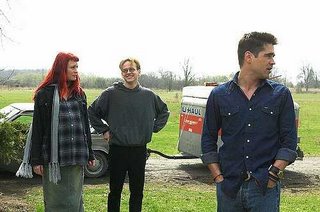
In the case of Bobby, family is something he’s never gotten the opportunity to experience. His older brother died tragically in front of his eyes, while mom and dad both passed due to a heated combination of heartbreak, depression and alcohol before he’s even finished High School. Insinuating himself into the good graces of social outcast Jonathan, Bobby soon finds himself another member of the boy’s family, so much so his new best friend can’t help but become jealous when his parents start treating the newcomer as more of a son than they do him.
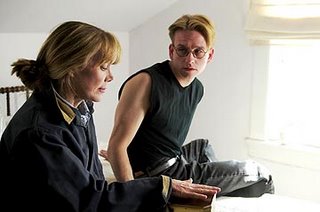 Fast forward a few years, Bobby is taking care of Jonathan’s (newcomer Dallas Roberts as an adult) family while the latter has gone to New York City to find himself. As circumstances change, the pair reunites in the Big Apple and estranged friendship – and maybe something more – is reinvigorated. It is here that Bobby meets Jonathan’s free spirit roommate Claire (Robin Wright-Penn, “White Oleander”), a flighty Bohemian beauty with plenty to teach this star-struck babe cowering timidly beneath the big-city lights. Together the trio invents a new kind of family, one that stretches the boundaries of normalcy, their lives ebbing and flowing into one another’s with all the passion of oceanic waves crashing ashore.
Fast forward a few years, Bobby is taking care of Jonathan’s (newcomer Dallas Roberts as an adult) family while the latter has gone to New York City to find himself. As circumstances change, the pair reunites in the Big Apple and estranged friendship – and maybe something more – is reinvigorated. It is here that Bobby meets Jonathan’s free spirit roommate Claire (Robin Wright-Penn, “White Oleander”), a flighty Bohemian beauty with plenty to teach this star-struck babe cowering timidly beneath the big-city lights. Together the trio invents a new kind of family, one that stretches the boundaries of normalcy, their lives ebbing and flowing into one another’s with all the passion of oceanic waves crashing ashore.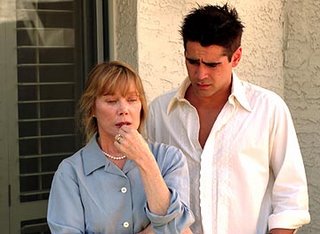 Having never read Cunningham’s novel it is readily apparent from what is on display here that it is a complex, emotionally charged piece of fiction daring to touch on a variety of subjects from the benign to the taboo. Spanning over a decade and taking us from childhood innocence to a young adult’s owning up to responsibility, there is a lot going on; far too much for one 95-minute motion picture. Too often the author and Tony award-winning director Michael Mayer (“Thoroughly Modern Millie,” making his theatrical debut) rely upon music video montage and pap emotionalism to get their points across. Characters appear, have a moment or two of importance, and then suddenly disappear and are promptly forgotten while rocker Duncan Sheik’s oppressively maudlin score moans incessantly.
Having never read Cunningham’s novel it is readily apparent from what is on display here that it is a complex, emotionally charged piece of fiction daring to touch on a variety of subjects from the benign to the taboo. Spanning over a decade and taking us from childhood innocence to a young adult’s owning up to responsibility, there is a lot going on; far too much for one 95-minute motion picture. Too often the author and Tony award-winning director Michael Mayer (“Thoroughly Modern Millie,” making his theatrical debut) rely upon music video montage and pap emotionalism to get their points across. Characters appear, have a moment or two of importance, and then suddenly disappear and are promptly forgotten while rocker Duncan Sheik’s oppressively maudlin score moans incessantly.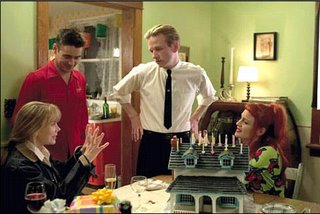 No more is this evident than in the performances of Sissy Spacek (“In the Bedroom”) and Matt Frewer (“Dawn of the Dead”) as Jonathan’s understanding parents. It’s not that both are actors aren’t any good – they’re borderline fantastic – it’s just that they have so little to do that’s not a cliché. Frewer’s big scene consists of a father-son chat with Farrell where he implores the young man to get out and take advantage of the wide world in front of him. It is a testament to both that this scene comes off as well as it does – it really is an inspiring moment of introspective evaluation – for as staged it shouldn’t even remotely be of interest.
No more is this evident than in the performances of Sissy Spacek (“In the Bedroom”) and Matt Frewer (“Dawn of the Dead”) as Jonathan’s understanding parents. It’s not that both are actors aren’t any good – they’re borderline fantastic – it’s just that they have so little to do that’s not a cliché. Frewer’s big scene consists of a father-son chat with Farrell where he implores the young man to get out and take advantage of the wide world in front of him. It is a testament to both that this scene comes off as well as it does – it really is an inspiring moment of introspective evaluation – for as staged it shouldn’t even remotely be of interest.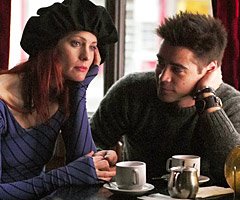
Spacek does fare better, Cunningham and Mayer giving the veteran actress moments where she can’t help but shine even if they do tend to dip into the contrived. Priceless bits include a clandestine marijuana session with the two boys and a late film monologue where she talks openly about her life and the dreams that might have been. Best of all, a scene with a teenage Bobby where she resorts to teaching the youngster how to bake because she just can’t find the words or the emotions to explain her feelings about what she’s discovered he and her son are doing in the dark. It is a poignant, powerful moment, and shows Spacek at her best, the actress delivering both sparks and tears with a simplicity that transcends celluloid.
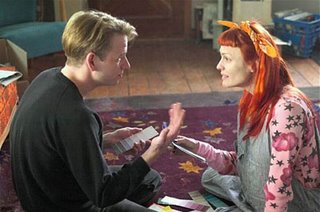 Yet, for all of the filmmaker’s flubs, they get so much right and the performances by the trio at the center are so good these flaws dissipate like morning dew. New York stage actor Roberts cuts a pained, tragically biting figure as the elder Jonathan. Even when Cunningham dips into the AIDS well, the actor rises above the ordinary and takes the character into fresh and unexpected terrain I really didn’t see coming. Meanwhile Wright-Penn is extraordinary as Claire and I hope Oscar finally takes notice nominates this superb actress. Her moments of sexual exploration with Bobby, her uncontrolled giddiness so fluidly mixing with respect and astonishment when she realizes he’s a virgin, is wondrous. It is as if she has an internal, instinctive link to the character going well beyond the norm, Wright-Penn doing more with a teary-eyed glance goodbye than most actors do with a histrionic speech.
Yet, for all of the filmmaker’s flubs, they get so much right and the performances by the trio at the center are so good these flaws dissipate like morning dew. New York stage actor Roberts cuts a pained, tragically biting figure as the elder Jonathan. Even when Cunningham dips into the AIDS well, the actor rises above the ordinary and takes the character into fresh and unexpected terrain I really didn’t see coming. Meanwhile Wright-Penn is extraordinary as Claire and I hope Oscar finally takes notice nominates this superb actress. Her moments of sexual exploration with Bobby, her uncontrolled giddiness so fluidly mixing with respect and astonishment when she realizes he’s a virgin, is wondrous. It is as if she has an internal, instinctive link to the character going well beyond the norm, Wright-Penn doing more with a teary-eyed glance goodbye than most actors do with a histrionic speech.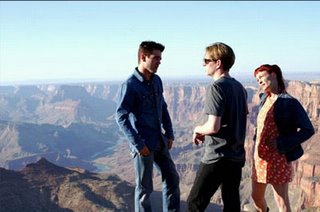 But, in the end, this is Farrell’s film and he runs away with it like a lioness protecting her cub. Bobby’s evolution from needy usurper of love to patriarchal father figure is astonishing. So good, so utterly precise is he in the role, I cannot imagine another trying to take it on. This performance is a thing of magnificence, the type actor’s dream of giving yet so seldom do, and if nothing else the movie resonates in my loins because of it.
But, in the end, this is Farrell’s film and he runs away with it like a lioness protecting her cub. Bobby’s evolution from needy usurper of love to patriarchal father figure is astonishing. So good, so utterly precise is he in the role, I cannot imagine another trying to take it on. This performance is a thing of magnificence, the type actor’s dream of giving yet so seldom do, and if nothing else the movie resonates in my loins because of it.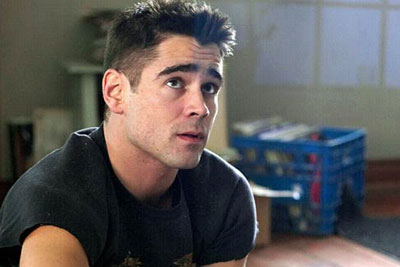
There are numerous other charms, however. Despite the choppy narrative, Mayer knows how to stage a scene and there are moments of such potent vibrancy I could feel chills run up and down my spine. He and cinematographer Enrique Chediak (“The Good Girl”) have a relationship so symbiotic it’s frightening. From images of a canary yellow Claire painted against a dusty Arizona landscape to the sight of Bobby and Jonathan dancing atop a New York city roof, images here will linger in my memory for quite some time.
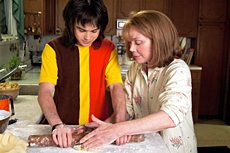
If it isn’t perfect, “A Home at the End of the World” is still an unforgettable experience if only to see such a group of gifted actors – especially Farrell – transcend the script’s unfortunate limitations. Filled with poetry both audio and visual, this is a film I can applaud and appreciate for it is willing to take chances and showcase performers outside of their comfort zones. If family is something you create, not just a thing you’re born in to, than this is one movie worth getting engaged to.
by Jackie Cronkhite
"It's just love."
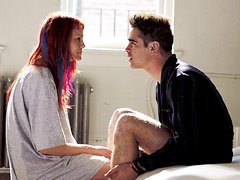 Based on the novel by "The Hours" author Michael Cunningham, "A Home at the End of the World" tells the story of a young man named Bobby. Growing up, Bobby idolized his older, free-spirited brother. But after his brother's unexpected death, Bobby becomes lost in his own life. A few years later, he befriends Jonathan, another seemingly lost soul looking for a friend.
Based on the novel by "The Hours" author Michael Cunningham, "A Home at the End of the World" tells the story of a young man named Bobby. Growing up, Bobby idolized his older, free-spirited brother. But after his brother's unexpected death, Bobby becomes lost in his own life. A few years later, he befriends Jonathan, another seemingly lost soul looking for a friend.The two form a close bond, one that carries into their twenty-something years. Jonathan, who is now openly gay, is living with another lost soul named Claire in New York City. Claire and Jonathan were making plans to have a baby together, but those plans are complicated when Bobby moves in. Bobby and Claire become romantically involved, and the trio form an unlikely family when they move out of the big city to the town of Woodstock.
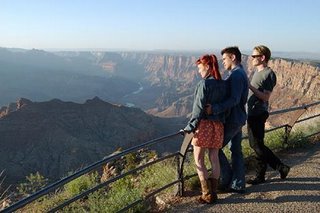
Cunningham adapted his own novel into the screenplay, and the writing is superb. There are many great lines of dialogue in this character-driven piece.
However, the biggest failing of "Home" is the fact that two of its main stars didn't seem to find a center to their characters.
Colin Farrell, has such a raw, unharnessed energy on screen that he's simply captivating to watch. However, with the exception of Joel Schumacher who directed Farrell in the indie "Tigerland," no other director has come close to channeling that energy into one amazing performance.
 It felt as though "Home" director Michael Mayer was holding his actors back. This applies to both Farrell and Robin Wright Penn, who stars as Claire. Granted, their characters are supposed to seem lost and not have a solid center, but in playing those characters, it felt like both Farrell and Wright Penn were being held back when they shouldn't have been.
It felt as though "Home" director Michael Mayer was holding his actors back. This applies to both Farrell and Robin Wright Penn, who stars as Claire. Granted, their characters are supposed to seem lost and not have a solid center, but in playing those characters, it felt like both Farrell and Wright Penn were being held back when they shouldn't have been.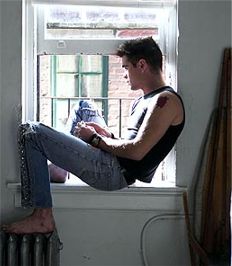 The passion, the intensity that should have come through the screen just wasn't there. I think that if the actors had been completely let loose, "Home" had the potential to really be a great film. Instead, it just comes out a little above average.
The passion, the intensity that should have come through the screen just wasn't there. I think that if the actors had been completely let loose, "Home" had the potential to really be a great film. Instead, it just comes out a little above average.Dallas Roberts' performance as Jonathan was the most steady of the film, along with a scene-stealing turn from Sissy Spacek as Jonathan's mother.
"A Home at the End of the World" is rated R for strong drug content, sexuality, nudity, language and a disturbing accident.
Bottom line: "Home" had the potential to really be a great film. Instead, it just comes out a little above average.
Colin Farrell
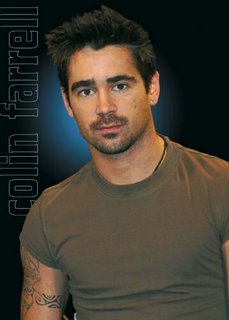 Colin Farrell Biography:
Colin Farrell Biography:Possibly Ireland's hottest cinematic export since Liam Neeson got his kilt off in Rob Roy, Colin Farrell enjoyed a generous helping of trans-Atlantic buzz for his work in Joel Schumacher's 2000 military drama Tigerland. Previously known in his native Ireland for supporting parts in film and television productions, Farrell earned both industry recognition and international heartthrob status for his portrayal of a young drifter recruited to fight in the Vietnam War, winning over critics and audiences with talent, charisma, and his fearless assumption of a Texan accent.
The son of famed footballer Eamon Farrell, Farrell was born in Dublin, on May 31, 1976. Growing up, he planned to follow in the footsteps of his father and an uncle, who was also a well-known footballer in the 1960s. However, Farrell's plans changed when, while he was still in high school, his sister enrolled in acting classes at Dublin's Gaiety School of Drama. His interest piqued, the nascent actor followed suit, signing up for classes at the Gaiety School and then making his film debut in a low-budget production called Drinking Crude before he even made it to the Gaiety's classrooms.

Having dropped out of high school in order to pursue acting, Farrell dropped out again -- this time from the Gaiety -- after a successful audition for the Irish TV series Ballykissangel. Joining the show in 1996, he earned a degree of fame in his native country, which opened the door for further work in the U.K. In 1999, he could be seen in the family drama The War Zone, Tim Roth's directorial debut, and on TV in Love in the 21st Century, a segmented series that also featured such up-and-comers as Ioan Gruffudd and Catherine McCormack.
His first glint of overseas recognition came the following year, when Farrell was cast in a supporting role in Thaddeus O'Sullivan's Ordinary Decent Criminal, an Irish gangster drama starring Kevin Spacey and Linda Fiorentino. Criminal, which didn't fare well on U.S. shores, was quickly followed by Joel Schumacher's Tigerland. Although the low-key ensemble film, which was set in a Louisiana boot camp in 1971, received a lukewarm reaction from critics and audiences, Farrell's performance was the subject of almost ubiquitous praise.
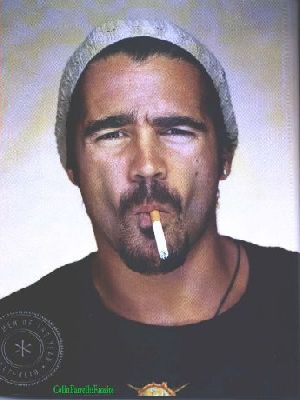 Quickly labeled as one of the most exciting new actors to be detected by the Hollywood radar, the young Dubliner subsequently found himself enmeshed in the distinctly American phenomenon of almost overnight success; before the year was out, he had secured starring roles in a number of projects, including American Outlaws, in which he starred as Jesse James alongside Scott Caan and Kathy Bates, and Joel Schumacher's Phone Booth, a thriller about a young man (Farrell) fighting for his life inside the titular enclosure. Although the long-delayed Outlaws did little for Farrell's career, far more ticket buyers were able to see the young actor alongside Bruce Willis in the somber POW drama Hart's War in early 2002.
Quickly labeled as one of the most exciting new actors to be detected by the Hollywood radar, the young Dubliner subsequently found himself enmeshed in the distinctly American phenomenon of almost overnight success; before the year was out, he had secured starring roles in a number of projects, including American Outlaws, in which he starred as Jesse James alongside Scott Caan and Kathy Bates, and Joel Schumacher's Phone Booth, a thriller about a young man (Farrell) fighting for his life inside the titular enclosure. Although the long-delayed Outlaws did little for Farrell's career, far more ticket buyers were able to see the young actor alongside Bruce Willis in the somber POW drama Hart's War in early 2002.The following year, Farrell was virtually unavoidable. Not only did 2003 see the release of the aforementioned The Phonebooth, is also found the actor on the right side of the law in both The Recruit and SWAT and on the wrong side as the villainous Bullseye in the /comic book superhero film Daredevil. As if the year was busy enough, he also turned up in a pair of smaller films, Veronica Guerin and Intermission.
 The two ensuing years might not have seen Farrell churning out a half-dozen pictures apiece, but he continued to grow in stature, first with a supporting part in the indie period piece A Home at the End of the World, then the title role in Oliver Stone's ambitious flop Alexander (both 2004). Indeed, Farrell's most notorious appearance around this time was, like so many before him, in a much-circulated sex tape leaked on the Internet. Two major roles in films by well-respected directors followed: The lead in Terrence Malick's critically-acclaimed but, again, little-seen The New World (2005), and the challenging role of author Arturo Bandini in Robert Towne's Ask the Dust. 2006 promised to turn around Farrell's downward box-office spiral with Michael Mann's much-anticipated remake of his own groundbreaking '80s TV show, Miami Vice. Rebecca Flint, All Movie Guide
The two ensuing years might not have seen Farrell churning out a half-dozen pictures apiece, but he continued to grow in stature, first with a supporting part in the indie period piece A Home at the End of the World, then the title role in Oliver Stone's ambitious flop Alexander (both 2004). Indeed, Farrell's most notorious appearance around this time was, like so many before him, in a much-circulated sex tape leaked on the Internet. Two major roles in films by well-respected directors followed: The lead in Terrence Malick's critically-acclaimed but, again, little-seen The New World (2005), and the challenging role of author Arturo Bandini in Robert Towne's Ask the Dust. 2006 promised to turn around Farrell's downward box-office spiral with Michael Mann's much-anticipated remake of his own groundbreaking '80s TV show, Miami Vice. Rebecca Flint, All Movie GuideDallas Roberts
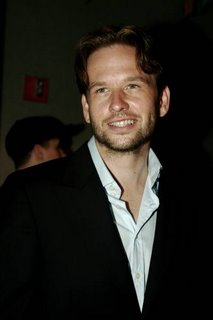 A graduate of the Julliard School, Dallas Roberts makes his debut in a leading role in a film, as Jonathan, in A HOME AT THE END OF THE WORLD. He will next be seen in Winter Passing, with Ed Harris , Zooey Deschanel, and Will Farrell from writer-director Adam Rapp for Focus Features; The Ballad of Bettie Page for director Mary Harron and HBO Pictures; and as legendary Sun Records founder Sam Phillips in Walk the Line with Joaquin Phoenix and Reese Witherspoon for director James Mangold.
A graduate of the Julliard School, Dallas Roberts makes his debut in a leading role in a film, as Jonathan, in A HOME AT THE END OF THE WORLD. He will next be seen in Winter Passing, with Ed Harris , Zooey Deschanel, and Will Farrell from writer-director Adam Rapp for Focus Features; The Ballad of Bettie Page for director Mary Harron and HBO Pictures; and as legendary Sun Records founder Sam Phillips in Walk the Line with Joaquin Phoenix and Reese Witherspoon for director James Mangold. Off-Broadway, Roberts co-starred with Edward Norton and Catherine Keener in the hit revival of Lanford Wilson's Burn This(for the Signature Theater). He also starred in True Love, as well as in the New York Theatre Workshop's production of Nocturne (for which he received a Drama Desk nomination for leading actor in a play).
Off-Broadway, Roberts co-starred with Edward Norton and Catherine Keener in the hit revival of Lanford Wilson's Burn This(for the Signature Theater). He also starred in True Love, as well as in the New York Theatre Workshop's production of Nocturne (for which he received a Drama Desk nomination for leading actor in a play). His regional theatre work includes The Contemporary American Theatre Festival, The Humana Festival, American Repertory Theatre, and the O'Neill Center.
His regional theatre work includes The Contemporary American Theatre Festival, The Humana Festival, American Repertory Theatre, and the O'Neill Center.

0 Comments:
Post a Comment
<< Home